SPOILER ALERT: This blog is for those who are watching season six of Mad Men. Don't read on if you haven't seen episode four
Catch up with Paul MacInnes's episode three blog here
Episode four: To Have and To Hold
'Harry has great ideas' – Scarlett
First we must deal with the consequences of ketchup: of being crushed by the King Kong of condiments, of saucy dreams that go splat. It was a cook-off, a one-in, one-out carousel of pitches that put Don directly against Peggy for the first time, but saw neither come away with the prized Heinz account. Both Sterling Cooper Draper Pryce and Cutler Gleason and Chaough manoeuvred like sharks hunting down fresh prey. In the end, the red stuff sprayed the wrong way.
Timmy from Heinz should never have been trusted in the first place; any man who makes a theatrical play of sucking off his wedding ring in a business meeting is a bit of a giveaway. (Being adulterous individuals themselves of course, Pete and Don didn't give it a second thought.) There was also the fact that, in the blink of an eye, Don had reversed his piety of the previous week and decided to entertain ketchup despite it being bad for beans. You look at these augurs and realise things were never going to go well, and that's before even mentioning Stan's conspicuous skulking into the Project K bunker. Oh, and the fact it was called Project K in the first place.
And yet the work as presented was pretty good. Not only that, it had an acetate overlay. Don's insistence that the best thing you could do to sell more Heinz ketchup was to refuse to use the word ketchup seemed obtuse. It was an idea that ran directly counter to Peggy's pitch, whose line "Heinz, the only ketchup" put the k word front and centre (it also put the bottle in the frame, another thing deliberately absent from Don's pitch). Looking back from the future, as we are often encouraged to do by Mad Men, we see that Peggy's statement was correct. We also see that Don made the greater intuition: he imagined a way in which businesses could make a deeper, more emotional connection with their consumers, by asking them to make an informal association with their brands. Ketchup becomes Heinz, vacuum cleaners become Hoovers, training shoes become Nikes. Somehow, products become personal.
For all the theorising, however, the pitches didn't amount to a hill of beans. Quite literally in SCDP's case, with Ken incandescent, Don like a bear with a sore head and Ted Chaough staring into space, last week's bravado replaced with a distinct wobble in his bottom lip.
*****
After giving the men of SCDP having their fair share of screen-time over the first couple of episodes, this week the women step to the fore. None are more welcome a sight than Joan who, despite being celebrated by her mother at last, seems lost in limbo. She's a partner at a Madison Avenue advertising firm but is treated by her juniors (looking at you, Harry Crane) as nothing more than an administrator. She's both a "certain type of woman" (divorced single mothers must only be referred to in euphemism) and an object of desire. She is both a beneficiary of social change and the victim of those who refuse to acknowledge it.
Of course Joan's personal story is more complicated than any simple reading of demographics would allow. This week we see that the ramifications of corporate prostitution continue to hurt her as juniors (looking at you, Harry Crane) use the knowledge of what happened to both blackmail the company and denigrate her. At the same time, we see that just because Joan is a trailblazer it doesn't mean she is always on the side of other women (sound familiar?). She sacks Scarlett for forging her clock-out card and does so in an instant. She nearly sacks Dawn for the same offence and then "punishes" her by putting her in charge of the clock-out cards. That this punishment is also a responsibility suggests that Joan might be considering Dawn's best interests, but she's certainly doing so in a manner one would have to describe as forbidding.
*****
It seems only fair to stay with Dawn as this was the week where Mad Men's first black character was actually given some flesh. From being a token presence in SCDP she is now as Pete charmingly observes, a valuable member of staff thanks to ongoing investigations by the "commission for human rights". There is a sense that this transition had also been granted to Dawn, too. A character who, up until now, was allowed to only offer one opinion – on the safety of heading uptown after dark – and was now allowed to express, you know, actual emotions and opinions and ambitions and stuff. (That these were not entirely dissimilar to Joan's was presumably not accidental.)
For Dawn's first scene in a lead role we are also transported to a place Mad Men hasn't been before: black Manhattan. The implementation of civil rights laws earlier in the decade may have meant a legal end to segregation but here we see that even in New York, whites and blacks remained separate. Dawn and her friend are in an African-American diner, discussing marriage and the difficulties of meeting someone. From just this brief exchange we learn that Dawn is strident, religious but not enamoured of that community and that she wants a man but, again not entirely unlike Joan, has her choices limited by societal norms .
Dawn's world is both different from and similar to those we have previously been exposed to. But we are reminded that for all the hurdles that are in front of the white female characters at the time, many more existed for a black woman.
*****
With her combination of spikiness and compassion, Dawn may well turn out to be an interesting addition to the mix of Mad Men. Which naturally brings us to Megan. I wonder whether I've fallen into a trap with this character. A trap that exposes my inner chauvinism as I seem able only to respond to the travails of a young woman pursuing her dream with a combination of "meh" and "harrumph" ("marrumph"?)
I worry because I find myself siding with Don over Megan and given the selfish, prudish, treachorous, patriarchal figure he is I know this ain't right. But really, why did Megan feel that having Don watch her maiden sex scene was such an affront? How can she feel so enthused about her career when she's only being used for her looks? How can she be so self-avowedly hip (Revolver, reefer) and yet so naive (swinging)? Am I missing something or is Megan only in this show to stand as a symbol, punishment for Don thinking he could find a perfect woman?
Notes
It's good to see Mike Ginsberg have some lines, even if only a handful. Outside of Roger Sterling he's the only character with a consistent, sardonic wit. In response to Bob Benson's ostensibly dumb "So, project K, what does it stand for?", Mike retorts in best agit-prop accent "PROJECT KILLLLL MACHINE!"
Pete's Dungeon is not looking any less dingy. You can have all the coloured-glass-panel doors and tartan throws that you like, it still looks like a place fit only for characters from The Twilight Zone.
Who will be the first to leave SCDP – Harry or Ken? Harry's strop was both maladroit and inappropriate, to the extent that you might think his bark is worse than his bite. Ken, meanwhile, stands politely outside the partner's meeting but still finds his account being pulled out from under his feet regardless.
Almost as a counterpoint to the toiling middle-rankers, we get to see the effortless old partners – Roger and Bert – perform one of their vermouth-dry dressing-downs, which is always a pleasure. As are Bert's socks. For what it's worth, they also remain the only two characters who are properly abreast of what's happening in the wider world:
Bert: "War or no war. Nixon doesn't think he's running against Johnson, he thinks he's running against the ghost of Kennedy." Roger: "So does Johnson."
Culture club
Broadway Joe on Broadway – Joe Namath, the New York Jets quarterback known as Broadway Joe, never sang on a Dow-sponsored variety show, but he did host a talk show, which was cancelled after one season. You can see why here.
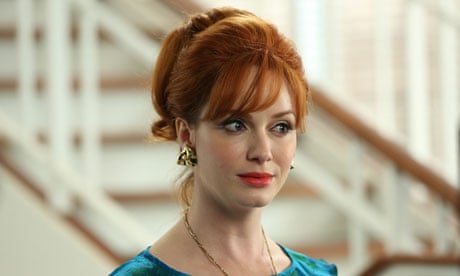
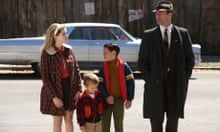
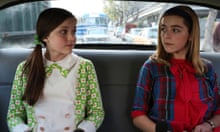
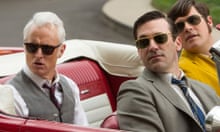
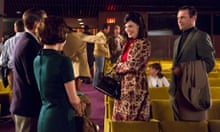
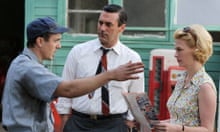

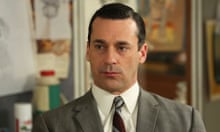
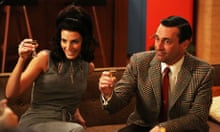
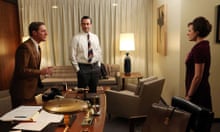
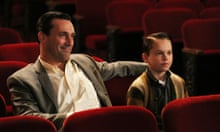
Comments (…)
Sign in or create your Guardian account to join the discussion